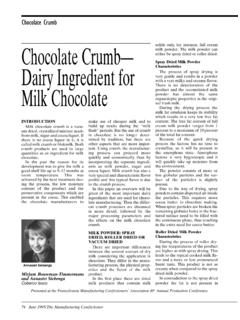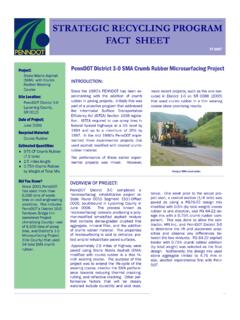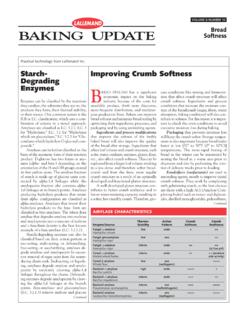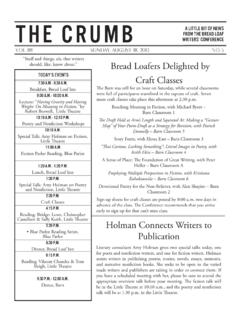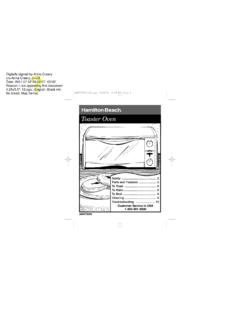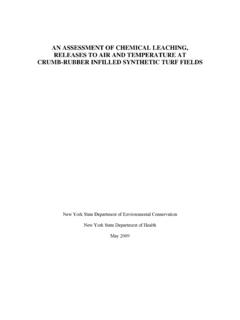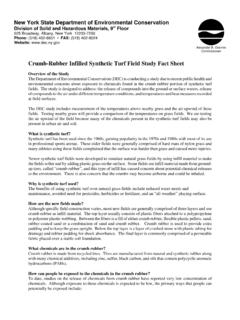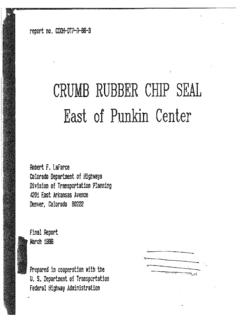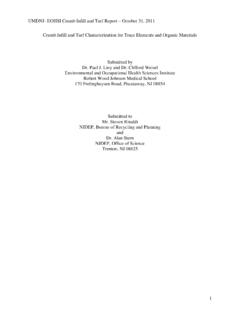Transcription of CR803 George Crumb - New World Records
1 CR803 George Crumb Music of Our Time, Vol. 3: Music of George Crumb Orchestra 2001 James Freeman, artistic director Ancient Voices of Children (1970) .. (24:59) 1. I. El ni o busca su voz (The little boy was looking for his voice) .. (4:10) 2. Dances of the Ancient Earth .. (2:30) 3. II. Me he perdido muchas veces por el mar (I have lost myself in the sea many times). (2:15) 4. III. De d nde vienes, amor, mi ni o? (From where do you come, my love, my child?) . (3:48) Dance of the Sacred Life-Cycle 5. IV. Todas las tardes en Granada, todas las tardes se muere un ni o (Each afternoon in Granada, a child dies each afternoon) .. (2:38) 6. Ghost Dance .. (2:17) 7. V. Se ha llenado de luces mi coraz n de seda (My heart of silk is filled with lights).
2 (7:17) Barbara Ann Martin, soprano; Derek Yale, boy soprano (mvts. 1 and 3); Noel Bisson, boy soprano (mvt. 5); Dorothy Freeman, oboe and harmonica; Patrick Mercuri, mandolin; David Crumb , mandolin (mvt. 3); Sophie Labiner, harp; Marcantonio Barone, electric piano and toy piano; Susan Jones, William Kerrigan, and Kenneth Miller, percussion; George Crumb , Kenneth Miller, and Marcantonio Barone, humming in mvt. IV; James Freeman, conductor A Little Suite for Christmas, 1979 (1980) .. (13:57) After Giotto s Nativity Frescoes in the Chapel at Padua 8. I. The Visitation .. (3:10) 9. II. Berceuse for the Infant Jesus .. (1:42) 10. III. The Shepherd s No l .. (1:08) 11. IV. Adoration of the Magi.
3 (1:41) 12. V. Nativity Dance .. (1:00) 13. VI. Canticle of the Holy Night .. (2:36) 14. VII. Carol of the Bells .. (2:36) Marcantonio Barone, piano Three Early Songs (1947) .. (8:47) 15. Night (Robert Southey) .. (2:59) 16. Let It Be Forgotten (Sara Teasdale) .. (3:17) 17. Wind Elegy (Sara Teasdale) .. (2:31) Barbara Ann Martin, soprano; James Freeman, piano 18. Dream Sequence (Images II) (1976) .. (14:22) Geoffrey Michaels, violin; Lori Barnet, cello; James Freeman, piano; Susan Jones, percussion; Sonja Downing, Ken Williams, and Sydney Foster, glass harmonica Total playing time: 60:02 & 1998 Composers Recordings, Inc. 2006 Recorded Anthology of American Music, Inc. Notes Some Personal Reminiscences about George Crumb I was a young first-year instructor in music at Swarthmore College and a freelance bass player when I first met George Crumb (b Charleston, WV, 24 Oct 1929).
4 The enterprising conductor of the Philadelphia Composers Forum, Joel Thome, decided to try out the new bass player in town and invited me to play in a concert that included the first book of Crumb s Madrigals, for soprano, vibraphone, and bass. Practicing my part, I was immediately entranced by the sensuous sounds, the remarkably acute understanding of the instruments, the clear sense that every note and every rest were essential to the piece, and the extraordinarily beautiful reflection of Lorca s haunting poetry. The piece literally changed my life, for I realized that I wanted to know and play every note this composer had written, and to share that music with everyone I knew.
5 The chance for me to become acquainted with George on a more personal level came with Swarthmore College s decision a few years later to erect the remarkable Lang Music Building and to commission a piece for the inauguration of the new building. The piece turned out to be Music for a Summer Evening (Makrokosmos III), for two amplified pianos and two percussionists. My friend and colleague Gilbert Kalish and I were to be the pianists. Surely one of the most exciting things for any performer must be to open the pages of a major new work whose arrival one has been impatiently anticipating for months, and to discover in those pages a masterpiece!
6 That is NWCR803 - George Crumb : Music of Our Time, Vol. 3: Music of George Crumb Page 1 of 8 certainly what Gil, Ray DesRoches, Richard Fitz, and I all felt on opening our mail one morning in December of 1974. Most of the rehearsals were held in Ray s studio at William Paterson College in north Jersey. George and I lived only a few miles from each other in suburban Philadelphia and drove the five-hour round trip together for each rehearsal. It was on these trips that I first began to know George apart from his music. One of my most vivid memories from those trips is driving home at three in the morning after one particularly long rehearsal and finding that I could not buy gasoline anywhere, despite the fact that we were close to running out because my license plate ended in an even number (this was in the midst of the gasoline crisis).
7 Barely able to contain myself, I was furious at the idiocy of the law and at the gas station attendant s absolute refusal to sell us a drop, but George was serenely (and characteristically) unruffled and said not to worry, he had heard that driving at exactly fifty miles per hour conserved gas most efficiently, and that he thought we had an outside chance of making it home if we did that. I am certain that with anyone else in the car, we would have found ourselves stranded on the Jersey Turnpike at 4 on a cold February morning. George maintained a constant close watch on the speedometer while I drove, correcting me immediately if the dial rose to fifty-two or fifty-three.
8 The car ran out of gas as I pulled into George s driveway. There is one fact about our recording of Music for a Summer Evening (made in 1975, now available on Electra/Nonesuch CD 79149-2) that I have always thought ought to be known. In the fourth movement, Myth, one of the pianists is asked to groan ( eerie, uncanny ) several times. All four of us tried, but George was dissatisfied with the timbre of everyone s groaning: one was too sensual, another too sleepy, a third too deep, and the fourth too comical. We asked him to do it, and it is in fact the composer s own groans timbrally perfect and not acknowledged in the liner notes that exist on the recording.
9 The founding of Orchestra 2001 in 1998 gave me the opportunity to bring a great deal of new music by a great many composers to a public that I think is just now beginning to thirst for more adventuresome programming. George s music has been a staple of our programs for ten years, and George himself has accompanied us on several European tours. In America, George Crumb is a highly respected composer of classical music, admired by many who have followed the development of contemporary music since the 1960s. But in Europe, especially Eastern Europe, George is a cultural hero, a star on whom people look with awe, almost a god-like figure for young composers.
10 We have had some wonderful adventures on these trips with George (and sometimes his wife Liz) in our midst. Probably the most memorable was our experience in Moscow in October 1993 when we awoke to the roar of tanks and sniper fire outside the windows of our spartan apartment a block from the Conservatory, and discovered we were in the midst of a revolution. Because it was unsafe to venture outside, we were confined to our quarters (twelve people sharing four small rooms) for three days. The large supply of Stolichnaya vodka we had managed to buy a few days earlier and my short wave radio (from whose BBC broadcasts we learned almost everything we knew about the events transpiring around us) kept us going.
